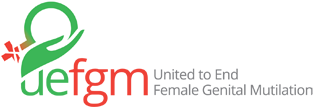 United to End Female Genital Mutilation(UEFGM) is a free-of-charge e-learning tool, offering information and practical advice about female genital mutilation (FGM).
United to End Female Genital Mutilation(UEFGM) is a free-of-charge e-learning tool, offering information and practical advice about female genital mutilation (FGM).
The United to End FGM (UEFGM) e-learning tool aims to raise awareness of and improve knowledge about female genital mutilation (FGM) amongst health professionals and asylum officers working in Europe, including midwives, gynaecologists, paediatricians, nurses, health visitors, medical and nursing students, asylum case and reviewing authority officers, asylum support centre staff, social workers and related NGOs.
Female genital mutilation (FGM) is defined by the World Health Organization as all procedures that involve partial or total removal of the external female genitalia, or other injury to the female genital organs for non-medical reasons1. It is practiced mainly in 28 countries in Africa, particularly Egypt and Ethiopia, and in parts of Asia and the Middle East. The WHO estimates that 140 million women and girls around the world have experienced a type of FGM. During one day 8,000 girls are subjects to such practices worldwide.
Online course (e-learning tool) on FGM
The UEFGM website offers a free online learning tool which helps to raise awareness on the practices and customs associated with FGM as well as its formal definition. The course consists of 2 Basic Modules and 4 Specialised Modules describing the problem from several angles, such as human rights, religious interpretation, traditional background as well as medical aspects of the FGM. All modules offer access to information through brief comprehensible summaries available on the website as well as a list of literature and further links at the end of every chapter. Each of the 6 modules provide access to documentaries and movies including campaigns and testimonies of women who have had close contact with FGM-practicing communities.
The website is very simple and intuitive. It is available in 3 languages: English, Italian and Portuguese. The course concludes in an e-certificate.
For more information click here.
Register here for the online course.
Tip: More up to date educational events dealing with “Humanitarian Assistance” can be found online on the Education Database »medicine & health«.
